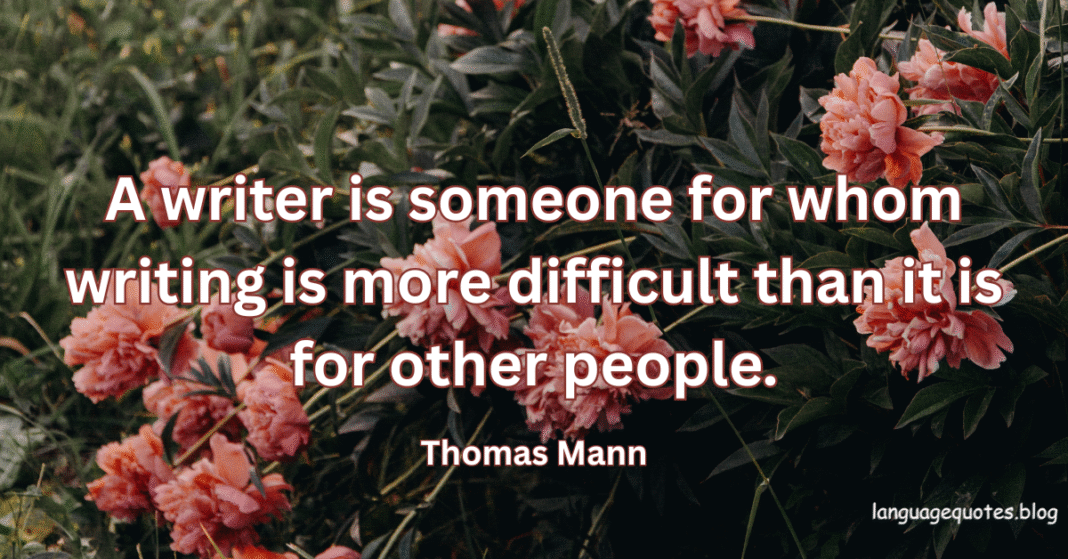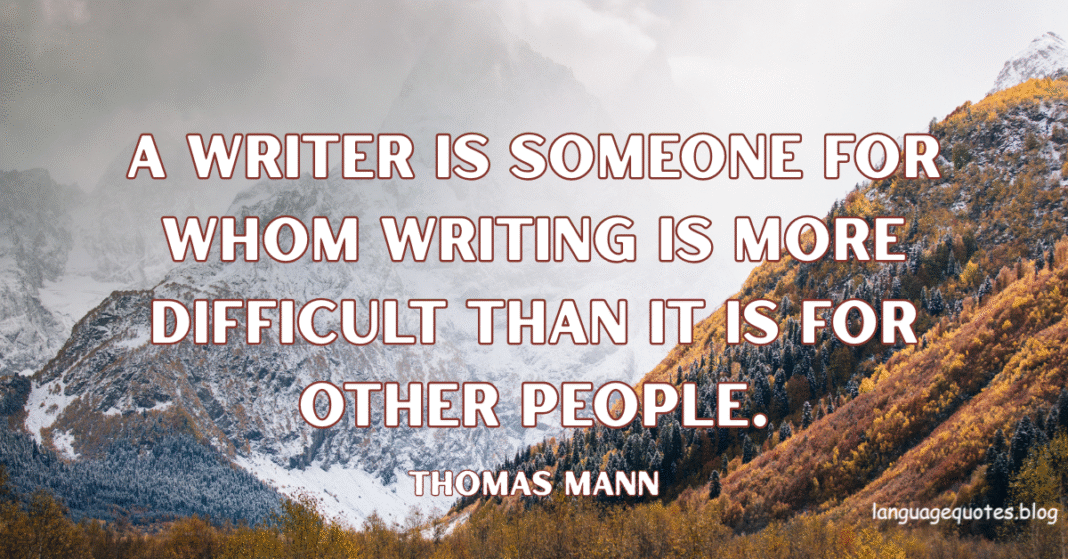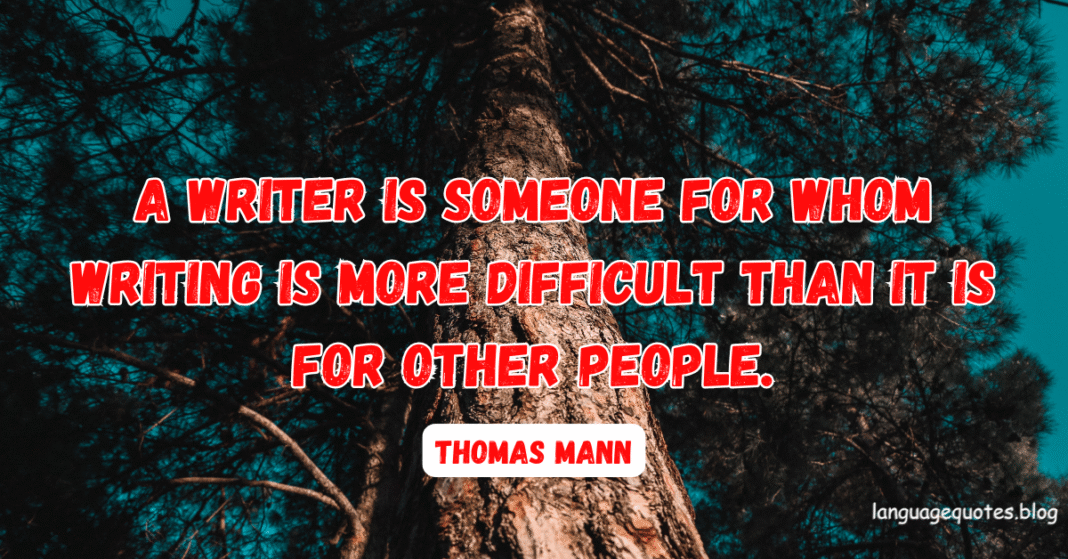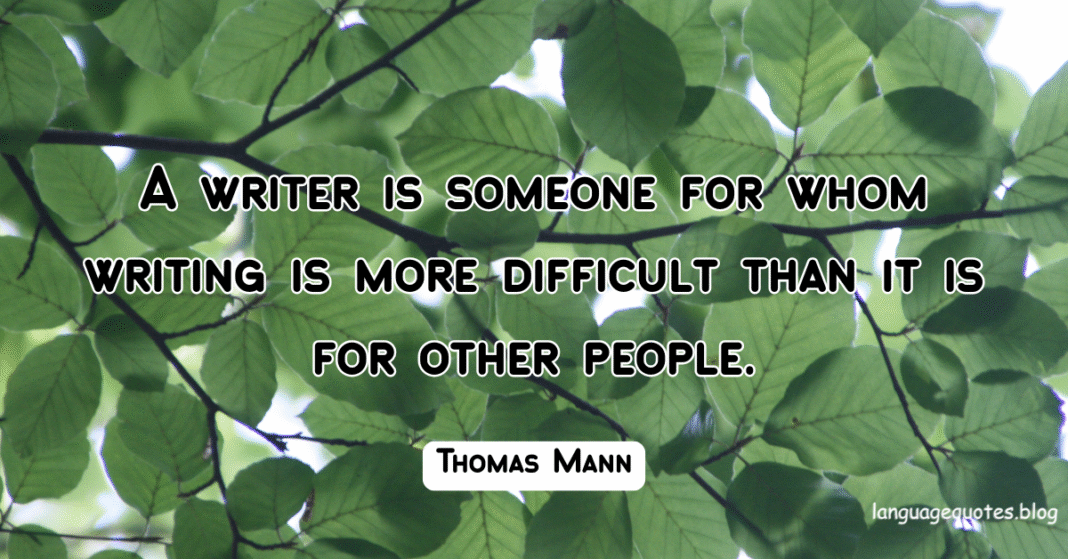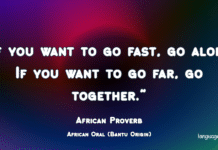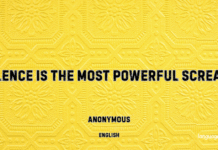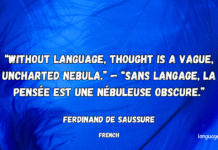“A writer is someone for whom writing is more difficult than it is for other people.” — Thomas Mann
💬 2-Line Comment:
Thomas Mann nails the irony of writing—it’s hardest for those who do it best. Struggle isn’t a weakness in writers; it’s a mark of their devotion to the craft.
✍️ Introduction: The Paradox of a Writer’s Struggle
Thomas Mann, a German novelist and Nobel Prize laureate, delivers a masterstroke of self-awareness and irony with this quote. At first glance, it seems paradoxical—shouldn’t writing come easily to those who do it professionally or passionately? And yet, the more serious the writer, the more complex and demanding the act of writing becomes.
This quote perfectly captures the internal tension experienced by writers: the immense pressure to articulate thoughts precisely, the vulnerability of expression, and the perpetual dissatisfaction with one’s own work. For Mann, and for many writers, the struggle is not a sign of failure—it is the very essence of the craft.
🧠 Why Writing Is Harder for Writers
To understand this quote, we must distinguish between writing as a casual activity and Writing as a deliberate, thoughtful, and sometimes agonizing process of creation. Most people write daily—texts, emails, posts—but writers do something more. They wrestle with language, truth, and meaning. They labor over tone, structure, nuance, rhythm, and resonance.
For non-writers, writing is often a means to an end: sending a message, completing an assignment, updating a status. But for a writer, each word is a commitment. It’s a decision that may require rewriting a sentence ten times before it feels “just right.” Writers are not content with simply saying something—they want to say it beautifully, truthfully, and originally. That is where the difficulty lies.
Thomas Mann’s quote reveals a profound truth: those who care most about writing suffer the most in the act of doing it.
🎯 The Weight of Expectation and Self-Criticism
One of the reasons why writing is harder for writers is the burden of high standards. The more refined your literary taste and understanding of craft, the more you recognize what falls short. Beginners often write with abandon, unaware of clichés or inconsistencies. But seasoned writers carry the burden of awareness, and with that comes paralysis, perfectionism, and self-doubt.
Writers question everything: Is this sentence clear? Is it too predictable? Will readers understand this metaphor? Does this character feel real? They revise obsessively, not because they want to—but because they can’t unsee the flaws.
This intensity makes writing exhausting, even tormenting at times. But it is also what makes great literature possible. Mann is reminding us that difficulty is not a weakness—it’s a hallmark of devotion to craft.
🔄 Writing as a Process, Not a Product
Another layer of this quote reveals itself when we consider the emotional and psychological toll of writing. Writers often work alone, confronting their thoughts and memories with brutal honesty. They dig into pain, beauty, trauma, and truth, all to translate intangible feelings into structured language.
Unlike other tasks, writing is not linear. There are days when nothing flows. Other days yield ten pages of brilliance. Writers revise endlessly, often deleting more than they keep. It’s a process filled with false starts, dead ends, and rare moments of clarity. What looks effortless to the reader is usually the result of months or years of unseen labor.
Mann’s quote invites us to respect this process. To appreciate that difficulty is not an obstacle—it’s part of the journey. And for the committed writer, it’s the price of authentic, powerful storytelling.
🧘♂️ Discipline, Not Just Inspiration
People often imagine writers as inspired geniuses, struck by lightning bolts of creativity. But in reality, writing is more discipline than inspiration. It’s showing up even when the words don’t. It’s staying with a paragraph until it sings. It’s fighting through writer’s block, imposter syndrome, and the urge to give up.
This is why writing is harder for writers—they know it’s not enough to just write. They must write well. They must push through fear, distraction, and doubt to find their voice. And even then, they’ll question whether it was good enough.
Mann’s quote exposes this reality. Writers don’t suffer because they’re bad at writing—they suffer because they care deeply about doing it right.
🔍 Universality of the Quote
While the quote is about writers, its wisdom extends to any craft done with passion. The chef who obsesses over every ingredient, the musician who repeats the same passage a hundred times, the artist who erases more than they draw—they all experience this paradox.
The more you grow in skill and awareness, the more difficult it becomes to meet your own expectations. This quote resonates with creators, perfectionists, and craftsmen of all kinds. It’s a reminder that struggle often signals growth, and that difficulty is not a flaw but a feature of serious commitment.
📘 A Glimpse Into Thomas Mann’s Own Journey
Thomas Mann didn’t speak from theory—he lived this struggle. His novels, such as The Magic Mountain and Buddenbrooks, are dense, philosophical, and meticulously crafted. He was known for his complex syntax and intellectual rigor. Writing for him wasn’t spontaneous—it was methodical, intense, and deliberate.
His quote reflects not just a writer’s frustration, but a lifelong relationship with the page. It is a quiet acknowledgment that writing isn’t always joyful—but it is always meaningful.
📝 Conclusion: Embrace the Struggle
“A writer is someone for whom writing is more difficult than it is for other people.” With this quote, Thomas Mann gifts writers with a truth that is both humbling and validating. The struggle to write is not a sign that you’re doing something wrong—it’s evidence that you’re engaging deeply with your art.
Writers must learn to embrace the difficulty, to recognize that it is the pressure that polishes the diamond. Real writing isn’t easy, and it isn’t always fun. But it is profound, rewarding, and transformative.
Mann’s wisdom tells us: if writing feels hard, you’re probably doing it right.


